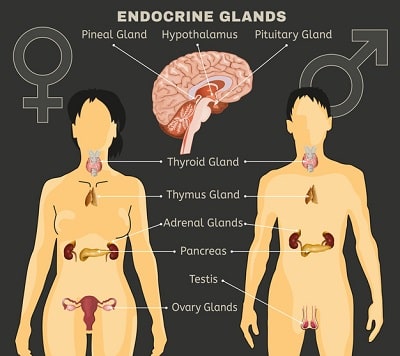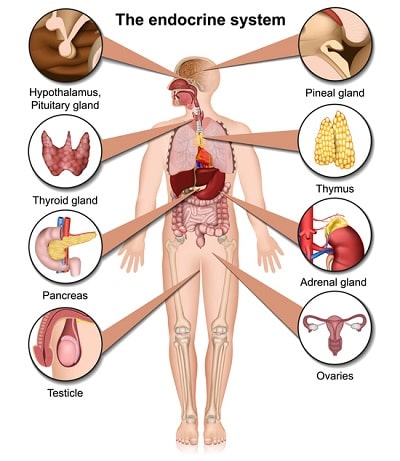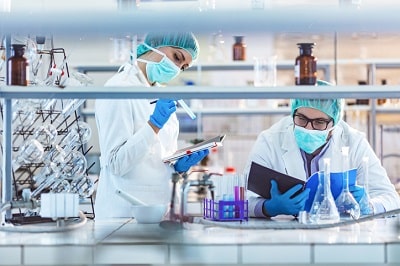
The media is often full of misinformation regarding the medical field of endocrinology. In this broad discipline, doctors specialize in treating hormonal imbalances and disorders to safeguard and promote not just health but holistic well-being. Here, we will debunk the myths associated with endocrinology and explore the realities of this exciting, well-researched area of anti-aging science with a bright future.
What Do Anti-Aging Doctors Do?
The term “anti-aging” is wide-ranging and covers many facets of health and wellness as it applies to the aging process. Below is the generally recognized, consensus definition of this field of medicine:
“Anti-aging medicine is an evolving branch of medical science and applied for medicine. It treats the underlying causes of aging and aims at alleviating any age-related ailment. Its goal is to extend the healthy lifespan of humans having youthful characteristics.”
There are many sub-disciplines within the field of anti-aging. In this article, we will pay special attention to anti-aging endocrinology. Endocrinologists focus on the hormones of the body and, more specifically, how to optimize hormones by reversing hormonal imbalances, which are defined as: “too much or too little of a hormone in the bloodstream. Because of their essential role in the body, even small hormonal imbalances can cause side effects throughout the body.”
The human body has more than 50 hormones that serve a wide array of functions to keep the body and mind functioning optimally – including maintaining strength by supporting muscle development, facilitating cognitive function, and regulating mood. Hormones are produced by various glands and organs in the body and distributed through the blood.
Hormones Involved in the Aging Process
Below is a sampling of a few (but not all) of the hormones implicated in the aging process:
- Thyroid hormones
- Testosterone
- Human growth hormone (HGH)
- Melatonin
- Cortisol
- Insulin
- Follicle-stimulating hormone
- Luteinizing hormone
- Norepinephrine
- Epinephrine (in the very old)
- Parathyroid hormone

Experienced anti-aging doctors who specialize in endocrinology understand the complex interplay between these hormones and how to balance them. In their clinical practices, anti-aging hormone doctors focus on identifying and resolving hormone imbalances for optimized, long-term health in aging populations.
Which Anti-Aging Healthcare Providers Should Be Avoided?
Like any rapidly developing discipline of medicine, the anti-aging medical field has some questionable members that patients should be wary of. As a general rule of thumb, the following types of anti-aging “doctors” should be avoided:
- Any “doctor” without a medical degree (at least a 4-year postgraduate) from an accredited Western university.
- Any doctor who offers a definitive diagnosis of a hormone deficiency – or, conversely, dismisses the possibility of a hormone deficiency — without performing the necessary blood tests.
- Any doctor does not take the time to go over your symptoms and medical history in detail.
- Any doctor who doesn’t go over the relative risks and benefits of a procedure or medication before recommending it.
- Any doctor who promises immediate results.
Any doctor who attempts to prescribe medications that are banned in the United States or imported from the Third World. The unfortunate reality is that, based on a study by the World Health Organization, as many as 1 in 10 medical supplies imported from the Third World are either “fake” or substandard.” While these medications may be cheaper than licensed, legal US-produced medical supplies, they also come with significant risk.
No responsible doctor would be willing to gamble his or her patients’ health and wellness in this way. As a rule of thumb, instead, you should look for the following characteristics in a solid, dependable, results-driven anti-aging specialist:
- Has the proper credentials (i.e., a recognized medical degree from an accredited institution).
- Takes the time to make an accurate diagnosis, including a personal consultation in which the patient and doctor discuss symptoms and goals.
- Orders appropriate lab testing to identify any underlying issues (hormone-related or otherwise).
- Together with the patient, carefully weighs options for therapy or other treatments, including in-depth cost-benefit analysis.
- Follows up with the patients during and after treatment to assess the effectiveness and, when necessary, make proper adjustments.
- Only utilizes the most advanced practices, techniques, and medications approved for use in the US.
Is There an ‘Anti-Aging’ Pill?
 For centuries, even millennia, explorers and scientists have searched for the so-called “Fountain of Youth,” most famously in the case of 15th-century Spanish explorer Ponce de Leon and his quest to locate the Fountain in Florida.
For centuries, even millennia, explorers and scientists have searched for the so-called “Fountain of Youth,” most famously in the case of 15th-century Spanish explorer Ponce de Leon and his quest to locate the Fountain in Florida.
That anti-aging “silver bullet” sought after for so long, perhaps in the form of a pill or otherwise, has not yet been discovered. While many supplements, therapy modalities, and other treatments have anti-aging effects, there is no single “anti-aging pill” available that can singlehandedly counter the impacts of aging.
Instead, the most effective anti-aging strategy available today is a combination of supplements, healthy lifestyle practices, and, when necessary, more advanced interventions such as hormone replacement therapy (HRT).
That said, exciting new research is, indeed, ongoing to possibly develop and test a single pill with robust, comprehensive anti-aging properties.
The Myths About Anti-Aging Medicine
Many people, based on conditioning, assume that aging is a “natural” and inevitable process that is destined to affect everyone born in the world. However, this assumption is simply not based on what the modern field of anti-aging research tells us.
As Richard Miller, director of Michigan University’s renowned anti-aging center, says:
“People assume aging is immutable and that it is a fool’s errand to look for drugs that slow the aging process ─ but they are wrong. We have documented four different drugs that work in mice to decelerate aging and postpone the diseases and disabilities which make aging troublesome.”
The Reality of Anti-Aging Medicine and Doctors
 Anti-aging medicine is a very real and legitimate medical discipline – and also one of the most rapidly advancing. As greater numbers of doctors, governments, and private medical enterprises worldwide wake up to the enormous upside of anti-aging science, we will see a continued explosion of research into this exciting field:
Anti-aging medicine is a very real and legitimate medical discipline – and also one of the most rapidly advancing. As greater numbers of doctors, governments, and private medical enterprises worldwide wake up to the enormous upside of anti-aging science, we will see a continued explosion of research into this exciting field:
“Leaders in gerontology have concluded that anti-aging drugs capable of delaying all diseases of aging by about seven years are now technically feasible. Such drugs would be very broadly effective preventive medicines, staving off dementia, cancer, heart failure, frailty — and myriad other old-age ills — in much the same way that drugs that lower blood pressure help postpone or avert heart disease.”
What Is Endocrinology and What Does It Study?
“Endocrinology” refers to the sub-field of medicine focused on hormones and how they affect human health. According to the commonly accepted definition of the term:
“Endocrinology is the study of medicine that relates to the endocrine system, which is the system that controls hormones. Endocrinologists are specially trained physicians who diagnose diseases related to the glands.”
Many endocrinologists specialize in specific glands and hormones, such as the reproductive organs (the testes in men and the ovaries in women), the thyroid glands, or the pituitary gland in the throat (which produces HGH).
Why Endocrinologist Are Real Doctors
Critics of anti-aging medicine, especially within the medical establishment, promulgate false narratives that endocrinologists are not “real doctors.” These claims are not based on reality.
In fact, endocrinology, and the doctors who dedicate their lives to its practice, are indispensable components of holistic, anti-aging healthcare:
“Endocrinologists are qualified to diagnose and treat conditions like diabetes, thyroid diseases, infertility, growth issues, metabolic disorders, osteoporosis, some cancers, and disorders in the hormone-producing adrenal glands and pituitary glands.”
Which Hormones Make You Look Younger?
Along with feeling and functioning your best, many patients are interested in anti-aging remedies to improve the appearance and provide a more youthful, vibrant look. Hormones that have clinical evidence of their capacity to improve the appearance of hair, skin, and nails include:
- Estrogen (for women)
- Testosterone (for men as well as women experiencing menopause)
- Human growth hormone (HGH)
- Melatonin
The Conditions and Disease States That Endocrinologists Treat
 Due to the role that hormones play in every major physiological process and their activities on every organ in the human body, the applications of hormonal healthcare are vast. Endocrinologists treat or play a role in treating:
Due to the role that hormones play in every major physiological process and their activities on every organ in the human body, the applications of hormonal healthcare are vast. Endocrinologists treat or play a role in treating:
- Infertility
- Cardiovascular disease
- Various cancers
- Metabolic (energy processing and fat burning) disorders such as diabetes
- Growth disorders
- Respiratory disorders such as COPD and asthma
- Mental health conditions
Below, we will explore two of the most common types of therapies that endocrinologists provide to patients.
HGH Replacement Therapy
Human growth hormone, or HGH, is a critical hormone implicated in anti-aging. HGH, together with its partner hormone IGF-1, performs the following functions:
- Regulating metabolism (i.e., burning fat and keeping energy levels high)
- Building healthy tissue, including muscle tissue through protein synthesis
- Optimizing mood and optimal cognitive function while preventing depression, anxiety, and other mental health disorders
- Strengthening bones to prevent osteoporosis, an age-related loss of bone density that leads to increased risk of fractures
- Protecting cardiovascular (heart) function
| Healthy HGH Levels | ||
| Adult Men | Adult Women | Children |
| 0.4-10 ng/mL | 1-14 ng/mL | 10 to 50 ng/mL |
Unfortunately, HGH levels tend to drop over time. When levels fall below the thresholds above, the patient is diagnosed with an HGH deficiency, also known as growth hormone disorder (GHD). For aging patients with diagnosed growth hormone disorder, HGH replacement therapy provides a wealth of anti-aging benefits that include:
- Supercharged metabolism (fat burning)
- Lean muscle development.
- Bone and joint support.
- Greater energy levels.
- Softer, healthier skin and hair.
- More youthful appearance.
 More worryingly, many doctors without advanced clinical practice in identifying and treating common age-related hormone disorders often mistake the signs of HGH deficiency for another condition. HGH replacement therapy with somatropin effectively treats HGH deficiency and restores the health of those who receive it. The top HGH supplements approved for use by US patients to reverse the negative health effects of HGH deficiency include:
More worryingly, many doctors without advanced clinical practice in identifying and treating common age-related hormone disorders often mistake the signs of HGH deficiency for another condition. HGH replacement therapy with somatropin effectively treats HGH deficiency and restores the health of those who receive it. The top HGH supplements approved for use by US patients to reverse the negative health effects of HGH deficiency include:
- Norditropin – (Novo Nordisk).
- Humatrope – (Eli Lilly).
- Saizen – (EMD Serono).
- Omnitrope – (Sandoz).
- Genotropin – (Pfizer).
- Zomacton – (Ferring).
Testosterone Deficiency (Hypogonadism)
Testosterone deficiency, known in clinical settings as hypogonadism, is another extremely common age-related hormone condition. Testosterone is the primary male sex hormone (androgen), and, as such, is responsible for male sexual vitality. However, its activities in the body extend well beyond sexual health. Men tend to lose about 1% of their total testosterone each year following peak levels in their early 20s. Even worse, researchers have begun to note a generational decline in testosterone levels with enormous implications for fertility as well as the health of aging men:
“Studies show that men’s testosterone levels have been declining for decades. The most prominent, a 2007 study in the Journal of Clinical Endocrinology and Metabolism, revealed a “substantial” drop in U.S. men’s testosterone levels since the 1980s, with average levels declining by about 1% per year.”
Because testosterone is critical for immune system function, men with low testosterone are at significantly greater risk of developing serious infections from COVID-19 and other pathogens. In men with testosterone deficiency, replacement therapy (TRT) has enormous benefits that include:
- Greater confidence
- Improved metabolic health including insulin sensitivity (important for controlling blood sugar spikes and the onset of diabetes)
- Optimized metabolism (boosted energy levels and greater fat loss)
- Increased cardiovascular endurance (via optimized red blood cell production)
- Renewed sex drive (libido)
- Reduced diagnoses of anxiety or depression
- More optimistic outlook
- Fortified bone density
- Increased muscle mass
- Harder, fuller erections

